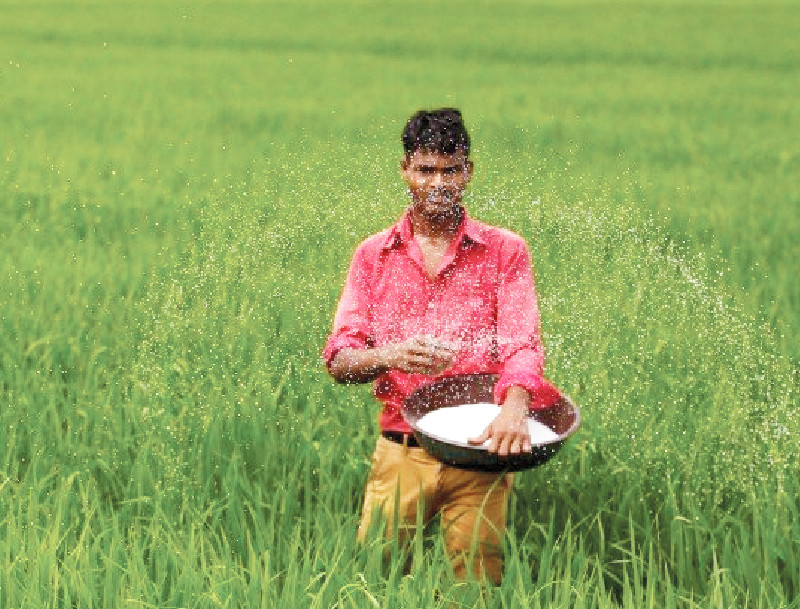
The Finance Division reiterated its stance that no additional subsidy would be provided on the supply of urea once the proposed mechanism of basket price is enforced. photo: file
ISLAMABAD:
The government is considering permitting fertiliser manufacturers to increase urea prices by up to Rs358 per bag, shifting the entire burden of over Rs30 billion in imports onto farmers. As part of the plan, manufacturers have been granted the basket price of imported and locally manufactured urea to pass on the full burden of Rs220,000 imported urea to farmers.
Agritech, a prominent player in the industry, has proposed a hike in its Maximum Retail Price (MRP) from Rs3,936 per bag to Rs4,095 per bag, indicating an increase of Rs159 per bag. Similarly, Engro and Fauji Fertiliser Company (FFC) have proposed an increase in price per bag to Rs3,766, up from the existing Rs3,595, reflecting an increase of Rs171 per bag. Fauji Fertiliser Bin Qasim Limited (FFBL) may see a more significant leap, with a proposed price of Rs4,339 per bag, compared to the current Rs3,981 per bag. This substantial increase of Rs358 per bag is poised to have widespread implications in the agricultural sector.
Furthermore, the Fatima Group has proposed varying increases for its products. Fatima (SDO – Single Drum Oven) is set to witness a hike from Rs3,671 per bag to Rs3,839 per bag, reflecting an increase of Rs168 per bag. Likewise, both Pak Arab and Fatima (SHP – Sulphate of Potash) have proposed increases in their MRPs, each by Rs159 per bag.
The Economic Coordination Committee (ECC), in a recent meeting, observed that fertiliser manufacturers would charge financing costs on the entire production of 6.2 million tonnes of fertiliser, providing them with undue benefits and increasing fertiliser prices in the country. The ministry was urged to resolve the issue at its own end, and in response, it was clarified that the financing cost would be charged only on 220,000 tonnes of imported urea. Regarding the supply of gas to fertiliser manufacturers, the ECC was informed that, as per past practice, the Petroleum Division would assess the existing arrangement of supplying gas/RLBG and provide gas to them on the best endeavour basis.
The ECC noted that the mechanism shall be further revised, and approval for an implementation mechanism, based on the principle of basket pricing, shall be placed before the cabinet. It was agreed that the National Fertiliser Marketing Limited (NFML) should determine the release price of imported urea. The Finance Division reiterated its stance that no additional subsidy would be provided on the supply of urea once the proposed mechanism of basket price is enforced.
Farmers await imported urea supplyIn earlier decisions, the ECC had allowed the Trading Corporation of Pakistan to import 220,000 MT of urea from SOC 8, Azerbaijan, which was ratified by the cabinet on November 25, 2023. On October 23, 2023, the ECC decided that the subsidy on the imported Urea would be borne by the provinces. Another decision on November 15, 2023, determined that the cost recovery of the imported fertiliser would be made from the provinces. Since then, the government of Punjab conveyed that it would lift the imported urea by sharing the subsidy at a ratio of 50:50 between the federal and provincial governments. The government of Sindh committed to lifting its share of supply – 52,800 MT (24% of 220,000 MT) on a full-cost basis. Replies from Balochistan and Khyber-Pakhtunkhwa were awaited.
In short, provinces have not been able to commit to carrying the entire burden of subsidy. The Trading Corporation of Pakistan (TCP) informed that cost estimates for imports of Urea for the quantity 220,000 would be Rs27.489 billion, and the landed price of a 50 kg bag of Urea had been estimated at Rs6,248/bag. The National Fertiliser Marketing Limited (NFML) informed that the cost to be incurred by it on incidentals – transportation charges – storage/warehousing, etcetera, would be approximately Rs4,918.45 million.
The Ministry of Industries & Production further informed that the above situation was discussed in a meeting chaired by the prime minister on January 1, 2024. The following decisions were made: It was decided that locally manufactured urea and imported urea would be treated as one basket; Based on previous practices regarding local urea and full cost recovery of imported urea, a price matrix will be determined for local manufacturers of urea; A committee consisting of the following will engage urea manufacturers and finalise an implementation mechanism: secretary Petroleum Division; secretary, Ministry of Industries & Production; secretary Ministry of National Food Security & Research; secretary, and Ministry of Commerce.
Published in The Express Tribune, February 11th, 2024.
Like Business on Facebook, follow @TribuneBiz on Twitter to stay informed and join in the conversation.

